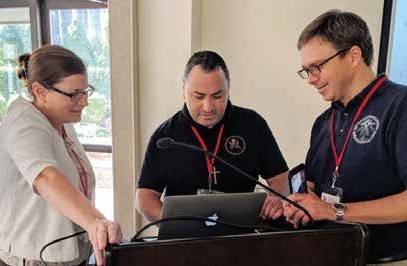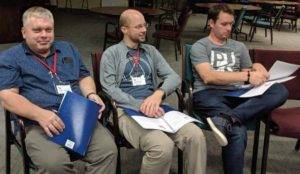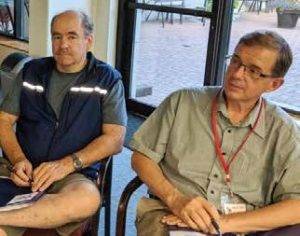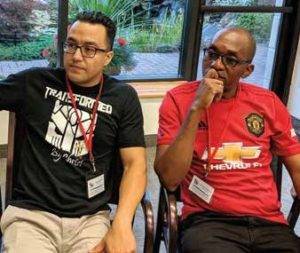Young Oblates Meeting
Pictured left: Facilitator Michelle Miller, Oblate Frs. Fernando Velasquez and Ken Thorson prepare to address the group.
25 Oblates (five each from U.S. and from the three provinces of Canada) gathered at Queen of Apostles Renewal Centre in Mississauga, Canada, the third week of September 2019 to : 1: continue to build and foster Oblate relationships among the younger members of the region and 2) to begin the discernment process to identify one or more ministries in the region which we could staff as a region. Leadership from each province likewise attended.
While the goals of the meeting seem clear, the process was more complicated. The facilitator Michelle Miller, said that the process is as important as the product of the meeting.
The Canada-U.S. region has a rich history of working together through CROCUS, the leadership team of Provincials and Vicar Provincials of the four provinces. CROCUS leadership initiated this dialog with younger Oblates to meet together to become better acquainted with each other and to discern about where we can minister more closely with one another.
With the numbers of Oblates in the region declining, the opportunity to more clearly identify which ministries take priority to bring the good news to the poor and abandoned takes a sharper focus. For this purpose, each of the provinces identified three or four ministries it embraces and presents as possibilities for a regional focus.
The U.S. Province listed four: the National Shrine of Our Lady of the Snows; the parish ministry in the White Earth Reservation; the ministry of Justice, Peace and Integrity of Creation; and Our Lady of Refuge parish in Eagle Pass, TX. While many other ministries could be identified as regional commitments, these four were the initial ones suggested.
Each Province, in identifying its priority ministries, was asked to review the six foci of the 2016 Oblate General Chapter as a basis for the ministries for presentation at this meeting.
Of these six foci, three seemed to stand out most clearly in identifying the priority ministries: mission and new faces of the poor; mission with youth; and mission and interculturality.
In his presentation, Oblate David Muñoz posed the question, “Where is the Oblate charism leading us, compelling us, to minister in the region?” Reflecting that Oblates do good work all over the world, we must still ask ourselves if we are authentically living that charism in our lives? “The focus must be primarily on ‘the man-the missionary’ rather than on the mission.” We are consecrated men with a passion for Jesus Christ and that must come first, before the mission we undertake,” he said.
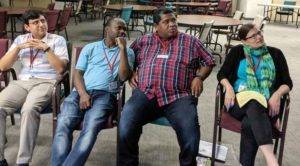
Left-Right: Oblate Frs. Steven Montez, Gerard Tsatselam, Alfred Ravelomampisandraibe and Facilitator Michelle Miller
Addressing the topic of interculturality in mission, Oblate Fernando Velasquez spoke of the importance of reflecting on our experience of mission in order to invigorate young Oblates to go to places and missions outside of their home country. Reflection also helps ensure a prioritizing and evaluating of the value of the ministry.
Adequate preparation for an Oblate going to a foreign land to mission is of utmost importance. “Pope Francis often speaks about an encounter, a reciprocity, of cultures which changes both the missionary and the people the missionary comes to serve,” Fr. Fernando said. “Interculturality doesn’t mean the missionary becomes one with the new culture where he serves but rather means that both the missionary and the people to whom he ministers are changed, enriched, and renewed by this exchange,” Mistakes have been made in the past when one culture was thought to dominate another. The way Oblates mission cannot be like that in the future.
The Superior General has made it known that often times Oblates have not been adequately prepared to minister in a new culture or have felt the new culture has not accepted or embraced his culture.
“Oblates must acknowledge their prejudices and biases and be willing to move beyond those prejudices in order to minister effectively in a new
cultural context. This can be a very difficult and challenging and longlasting process,” Fr. Velasquez said.
On a more positive note, Fernando mentioned there are many Oblate intercultural success stories and they need to be carefully studied and applied, where possible, to future missionary endeavors.
On Wednesday, each of the ministry priorities chosen by the four provinces was shared with the entire group, explaining how that ministry
fosters and speaks to the six foci of the General Chapter. From these ministries, the group was tasked with choosing the most desired ministries
to be considered for possible regional collaboration.
Thursday found the group evaluating the meeting thus far. There was general consensus that being together, getting to know each other better, becoming better acquainted with each others’ ministries, backgrounds, way of living our Oblate life in community provided a good background toward choosing a regional ministry.
The thought was expressed that simply our planning together is also an important way of being regional. The planning itself necessarily involves
choosing Oblates who are leaders, capable and excited to work with other Oblates and ready to leave nothing undared for the sake of the mission.
Several possibilities for a regional ministry site were more carefully considered. Such criteria were: viable community life, ministry with the materially poor, opportunities for further outreach to the new poor in the area, opportunity for youth ministry.
The dialog continues. CROCUS will make final decisions about future regional ministry possibilities. The participants agreed that this meeting helped in getting to know each other better and that formation for ministry (one of the key foci of the General Chapter), was a key element
of this meeting, as well as greater knowledge about the topic of intentional interculturality.
The young Oblates were very positive about future collaboration and they felt they had taken some significant steps toward that collaboration.
Oblate Managers Meet with Oblate Leadership Team
The Oblate Leadership Team met with the Provincial Administrative Assistant, Laura Glasgow, and three Office Managers on October 23, at King’s House, Belleville, IL.
This annual meeting provides the opportunity to speak about issues of concern, share information, formulate common policies among province
leadership and the office managers, located in Lowell, MA, San Antonio,
TX and Belleville, IL.
These Office Managers are responsible for organizing and preparing for all province meetings, Oblate personnel concerns of power of attorney, end of life issues, keeping files up to date, personnel booklet and ensuring that employee policies and procedures are uniform throughout the Province.
Their contribution to the smooth running of the Province is invaluable.
As we discovered at our recent meeting, it is often they who remind leadership about “next steps” needing to be done regarding an upcoming meeting or putting final touches on a plan to be implemented in the Province.
By Louis Studer, OMI – Provincial of the US Province


